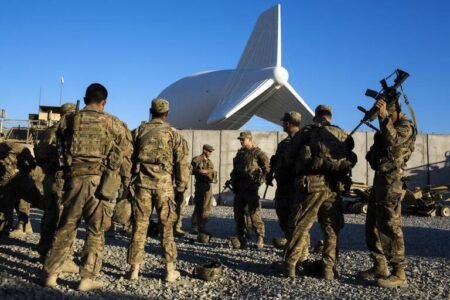As vigilantes in Tungar Kara town, in northwestern Nigeria, readied themselves to confront an armed gang in a nearby forest last Saturday, the local residents expressed their support through cheers and prayers for the safety of those embarking on the mission.
Before they embarked on their mission, the town experienced an airstrike by the Nigerian Air Force (NAF), which claimed to have targeted the armed gang. However, residents reported that 15 civilians, including members of the vigilante group and other bystanders, were killed in the attack.
The Nigerian Army and air force have increasingly employed aerial assaults to combat the rising threat in Nigeria’s northwest and central regions posed by armed criminal gangs, referred to locally as bandits, who kill villagers and conduct mass kidnappings.
However, residents and analysts indicate that the campaign is taking a significant toll on Nigerian civilians and diminishing their support for the military.
Salihu Usman, a vigilante assigned to safeguard the town from armed gangs, said that he was praying when a jet roared in the sky. Suddenly, a loud blast echoed, and he found himself sprawled on the ground, injured.
“Now whenever I see a military plane flying during daytime, I think it is a threat to my life,” said Usman, who said his stomach was partly ripped open and has lacerations on his body.
“Bandits kill us and the military bombed us from the sky.”
In a statement on Monday, the NAF denied it targeted civilians but said it would investigate Saturday’s strike on Tungar Kara, a remote town in northwestern Zamfara state.
Haliru Attahiru, a 30-year-old farmer, said he did not believe the airstrike was an accident.
“How do you come to bomb people in the town and not in the forest? The bandits are there in the forest,” he told Reuters by phone.
In December, an airstrike killed 10 people in nearby Sokoto state, in an attack the state governor said had mistakenly targeted civilians. The strike continued a pattern of deadly aerial attacks by the military in which civilians have been killed, the subject of a Reuters special report in June 2023.
“If the people discover that they are not saved from the bandits and are fast becoming collateral damage through the air campaigns by the air force, it will affect their support for the military,” Oluwole Ojewale, a researcher at the Institute for Security Studies, said.
Usman would not be returning to his vigilante group after his narrow escape. He says he now harbours a distrust for the military and even doubts that the airstrike was a mistake. “I even suspect they collaborated to harm us,” he told Reuters.









